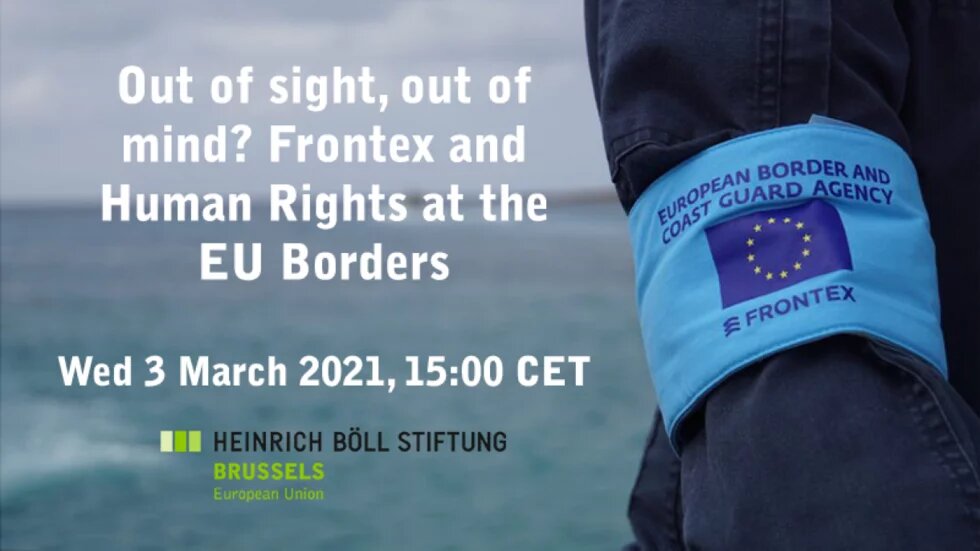Civil society organisations as well as journalists have reported a growing number of cases of so called pushbacks – illegal state measures by which refugees and migrants were forced back over a border, without any possibility to apply for asylum – at the EU external borders in the Aegean and in the Western Balkans.
In October 2020, a group of media outlets published evidence about Frontex vessels involved in human rights violations in the Aegean Sea. The evidence shows how Frontex witnessed the Hellenic Coast Guard conducting pushbacks but also how the EU agency’s was actively involved in these activities. The situation at the Croatian-Bosnian border, where pushbacks and violence by the Croatian authorities are reported constantly, also raises questions on the involvement of Frontex in these breaches of human rights.

The allegations led Home Affairs Commissioner Ylva Johansson to call for an urgent, extraordinary Frontex Management Board meeting and the EU Ombudswoman to open an inquiry. In theory, the European Border and Coast Guard Agency Regulation (Regulation (EU) 2019/1896) foresees Frontex’s obligation to terminate activities in case of violations of fundamental rights, as well as several mechanisms to prevent such breaches. Frontex was accused of not having met its own obligation to file so called “Serious Incident Reports” (SIR) when witnessing any legal violation and for not having recruited at least 40 “fundamental rights monitors” to oversee the agency’s compliance with human and EU rights which should have been implemented by December 2020.
Furthermore, Frontex is also being reported to have met with a number of unregistered lobbyists and the EU’s anti-fraud agency OLAF has opened an investigation into the agency over serious allegations of harassment, misconduct and migrant pushbacks as well.
So far, Executive Director Fabrice Leggeri denies his agency’s involvement in any pushbacks, claiming to have found no evidence” of Frontex staff taking part in illegal activities.The European Parliament Committee on Civil Liberties, Justice and Home Affairs decided in January 2021 to set up a Frontex Scrutiny Group.
In light of these serious allegations on the one hand and the recent dramatic expansion of the agency regarding the scope of its mandate, its budget and personnel, the EU office of the Heinrich-Böll-Stiftung in Brussels organised an online discussion on the consequences arising from these incidents from legal, political and public authorities’ perspectives. Our new colleague Neda Noraie-Kia, Head of Migration Policy Europe, had the pleasure to moderate a debate among:
• Prof. Nora Markard, Professor for International Public Law and International Human Rights, University of Münster
• Matthias Oel, Director - Borders, Interoperability and Innovation, Directorate-General for Migration and Home Affairs, European Commission
• Andreas I. Pottakis, Greek Ombudsman
• Tineke Strik, Member of the European Parliament, Greens/EFA, rapporteur of the new European Parliament Frontex Scrutiny Working Group
The panelists approached questions such as the EU and member states’ legal frameworks, ways to ensure and safeguard human rights at the EU external borders and the varying roles and responsibilities of the European Commission, the European parliament and its scrutiny group, in specific, member states, media and civil society in doing so. Some 200 participants joined the debate, which lasted for about an hour among the panelists and another half hour together with the audience. You can watch the discussion on demand here.
Not only the high number of participants, but also the amount of well-informed questions raised by them can be seen as proof, that “out of sight” regarding human rights at the EU external borders does not equal “out of mind”. There is a vivid debate going on regarding the role of Frontex and the Heinrich Böll Foundation will surely continue to put these questions on the agenda.
In support of the above claim, in Greece, on March 30th, a group of 49 civil society organisations co-signed a joint action for the creation of an initiative of organisations against push-backs, several of which have already submitted reports and complaints to international and European bodies, aiming at the effective investigation and prosecution of illegal push-back practices. In addition, the group of 49 calls on civil society organisations and bodies to come together in an initiative to address the demands below to national, European and international bodies:
• The immediate end of illegal push-back practices that endanger the Rule of Law and fundamental human rights
• The establishment of an independent mechanism for the systematic recording and substantiation of reported push-back cases
• The protection of the victims and the facilitation of their access to justice for the substantial investigation of their complaints
• The protection of the organisations and citizens that record and publicise incidents of pushback.
As Heinrich Böll Foundation we will continue working closely with civil society organisations and other stakeholders that stand for the rule of law and the respect of human rights and with our new program on migration we will continue addressing the issue of pushbacks and refugees’ rights at the European Borders, so stay tuned!